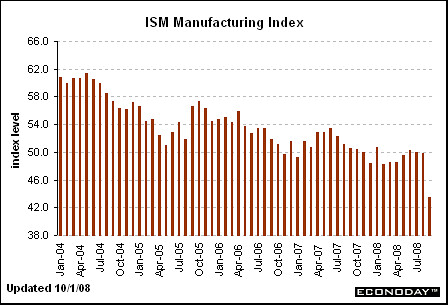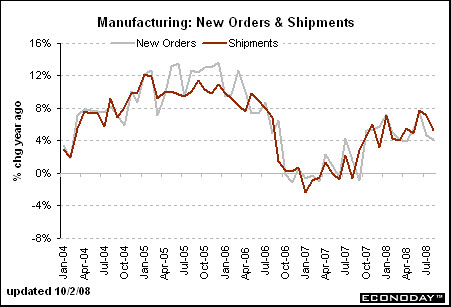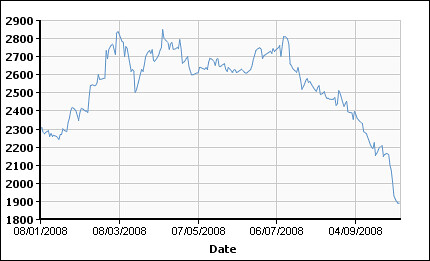Greetings, and welcome to new edition of Manufacturing Tuesday. Normally there is a Manufacturing Monday, but sometimes we just can't get the edition out on time. Still, the show must go on, as they say.
Now if manufacturing were a show, this would probably be either a Greek tragedy or a horror. Because, folks, things aren't looking that great. Some economic numbers out late last week point to industrial activity slowing down or stalling. The current credit crisis is causing delays in payments. Smaller industrial enterprises are suffering the most with their credit lines cut down or completely frozen.
By the numbers
Let me hit you with the biggest of the manufacturing econ numbers, the ISM Manufacturing Index. The Institute of Supply Management's index is one of those "benchmark" economic numbers that the Street follows. From employment to production to supplies to inventory, ISM gets 300 non-service companies to participate monthly.
The latest ISM manufacturing survey, for September, highlighted the current scare going on throughout the economy. August's reading had already dipped below the neutral 50 figure to 49.9. The latest figure saw a further drop, to 43.5, well below the 48 to 51 consensus estimates. Any reading below 50 means a decline in manufacturing activity, though that does not mean the economy as a whole is contracting. But of course, judging from other economic numbers, I think you could make the case that they go hand in hand.
Following this was last Thursday's release of Factory Orders. What we have here is the twin brother of the ISM's picture. For the uninitiated, the Factory Orders numbers are just that, new orders for durable and non-durable stuff. My only criticism of this economic indicator is that these reports are more than two months behind, so last week's report is for August. So think of this as a confirmation or lagging indicator at best, still we should look at it.
Now going into last Summer, we noted in the past, that industrial activity was increasing. Of course, this was well before the economic/physiological tsunami known as the "Credit Crisis" really came into the fore. What's interesting, is that though it was perceived that industrial activity was growing, the Factory Orders report shows that the opposite was happening...and my what big change that was! The previous month (for July) saw a 1.3% increase. You can see the start of the worrying on credit with the consensus estimates, which ranged from a stark - 6% to only an increase of a half of a percent. In the end, we saw a - 4% figure for Factory Orders, confirming that things were starting to go sour on the industrial sector.
Steel for a steal?
One good way to gauge the economy, is to look at certain industries and commodities. For example rising corn and cocoa can be inflationary, as it lead to rising prices for Hershey's. Material costs add to the overall production costs, which ultimately get passed on to you, the consumer. Saying this, prices on commodity products also reflect demand. This is the case with steel, as the Financial Times has highlighted.
Fred Madden, vice-president for administration at Consolidated Metal Products, a Cincinnati-based car partsmaker, says his company’s steel purchases are likely to be down by 10 per cent this year from 2007, as an effect of falling demand from his company’s main customers.
“We are hoping demand will get a little better next year. But for 2009 as a whole about the most we can hope for is that our business will be flat compared to this year,” says Mr Madden.
Prices for many grades of steel have fallen substantially in the past few months. Many companies such as Mr Madden’s are putting new orders on hold, in the hope prices will fall even more during the next couple of months.
- excerpt from "Steel outlook falters as demand falls", Financial Times, 2008
It will be interesting to look at the upcoming earnings announcement from companies like ArcelorMittal. Prices in other metals also give credence to steel's southward movement. Below is a chart for London Metals Exchange's index on various aluminum. As you can see, by the middle of the Summer, prices started to go back down.
(data provided by the London Metals Exchange, 2008)
The Trojan Horse Microchip
Now I'm going to bring up something, that frankly, I'm surprised hasn't been brought up already. Something that is one of the most dangerous results of unfettered free trade. What, pray tell could that be? Counterfit microchips, semiconductors that are either half-ass knockoffs or complete non-functioning fakes! This is almost reminiscent of previous stories of food filled with cardboard or toothpaste or dog food tainted with poisonous run off. It's no secret that China is one of the hotbeds of piracy. One can almost find virtually every street front venders on every block in cities like Gangzhou or Shanghai and find pirate copies of movies or music. So it was only a matter of time, when pirating of intangible intellectual property would graduate to the physical. Yes, there have always been knock off Pradas, but what about knock off non-functional CPUs?
Businessweek highlights such a thing. Particularly, fake faulty electronics finding themselves in aviation products and defense systems. You know, for years many in organized labor and various business leaders had warned that there was a tie between national security and free trade. Well, ladies and gentlement, here is one such example to provide as proof to that argument!
The American military faces a growing threat of potentially fatal equipment failure—and even foreign espionage—because of counterfeit computer components used in warplanes, ships, and communication networks. Fake microchips flow from unruly bazaars in rural China to dubious kitchen-table brokers in the U.S. and into complex weapons. Senior Pentagon officials publicly play down the danger, but government documents, as well as interviews with insiders, suggest possible connections between phony parts and breakdowns.
In November 2005, a confidential Pentagon-industry program that tracks counterfeits issued an alert that "BAE Systems experienced field failures," meaning military equipment malfunctions, which the large defense contractor traced to fake microchips. Chips are the tiny electronic circuits found in computers and other gear.
- excerpt from "Dangerous Fakes", Businessweek, 2008.
How many military systems are infected with such fraudulent technology? Good grief, the danger of this is on so many levels. Brake systems in Humvees to guidance systems in helicopters may not operate because a fake chip may not function at a critical moment. And how about espionage, as the article noted? What's to say that there aren't systems-on-a-chip that are serving dual purposes on sensitive systems within national security? What about the domestic commercial front? You know I bring up Hummers, yet what about brake systems in the car you drive?
This is one of the critical reasons why free trade, as it is, must be stopped. This is why there must be better oversight in examining products coming into this country. This is why we need to start making more things in this country for this market! I say find these unscrupulous bastards who would disregard caution and product inspection and throw them in jail, take everything that they own. I'm sorry, but this is also another symptom of the broken system of defense product procurement. We need an overhaul of how things get purchased by the Pentagon.





Comments
meanwhile back at the debate....
nothing on trade and any mention at all of the horrific statistics or the trade deficit is met from McCain as protectionist (what BULLSHIT! What about a massive trade deficit can't this guy get through his brain????) and then on the Obama camp, well, it's about as bad! Oh, Americans need more training and education which is precisely the same B.S. that Bill Clinton said through Robert Rubins while they crafted the great exodus of middle class wealth and prosperity out of this country.
Really disgusts me!
Thanks for doing this series. It's awesome and despite the desire of our government to continue with their ill conceived global labor arbitrage agenda....completely ignoring the US is seriously losing and now will hit back the world financial players as well....
Did you see tradeform.org (middle column)? They are putting together a broad, bi-partisan coalition of groups to get something done on trade as well as boost up manufacturing, AG, other sections....(whoever is reading this...ya know the type of jobs that can make a house payment!).
Counterfeit chips
Clearly the counterfeit chips article underscores 3 of the major issues with "free" trade - product quality has been a major casualty, intellectual property theft, and the ramifications for national security as technology is offshored. yet NONE of these issues are ever discussed in the MSM, or the political discourse. Free traders continually spout their talking point of "improved" product quality as a benefit of trade despite all the evidence to the contrary - look at all the imported products that do not last nearly as long or work as well as the domestic products they replaced - consumer electronics, appliances, houswares, shoes, hand and power tools, furniture and so on. Tools used to last decades and be passed down from dads and grampas, chinese and mexican tools for example are only good for a few uses then they are junk - and good luck finding half inch wrench that fits right on a half inch bolt! Same brand same price shoes that used to be made in Maine and last years fall apart rapidly, furniture that used to last generations, now replaced with cheapo pressboard crap. Appliances used to last decades, new ones are lucky to last a few years and cost more than they are worth to repair - if you can find someone to work on them!
Philco tvs and GE toasters
I was priveledged to own an actual American-made television, that sadly just went bust. We purchased this Philco TV over 24 years ago at a local electronics shop. Yes, over the years, the little thing needed repairs, but it was never nothing major. My friends and family said replace the thing, but I couldn't..how could I? How many "Made in the USA" televisions were out there? I couldn't find one. No, I threw logic out the window and kept my little Philco out of sentimentality and love of what went behind putting it together. Unfortunately, the tube finally went, a miracle if you think about it, two decades of constant use and only now does it die on me. I've had newer televisions, including one of those new HD TVs, but that little Philco had a special place in my heart.
But it wasn't just televisions. Many years ago, we owned a GE Toaster, it was one of those small oven units. I had purchased this as gift to my mom (she was going through a "I gotta make everything in toast form" phase). I purchased this in my freshman year in high school over a decade or so ago. At the time, I paid no attention to the label of where it was made. It had become simply "the white toaster" in the kitchen. A staple image in the scene, that made everything from cookies to..well toast. Unfortunately, like my television, it too died after a decade or so of usage. You can probably guess, yes...the toaster oven was "Made in the USA". I only realized this as I was tossing it out and saw the label. My parents had since purchased a new toaster from Walmart, one of those namebrands made in China. While that old GE unit was a workhorse, my parents have since gone through 2 different toasters. I guess that says it all.
Philco tvs and GE toasters
Indeed
I have one of the last US made RCA TVs in the basement - that Bloomington IN plant closed about a decade ago. Some may say that Sony makes TVs in the US - but that operation is nothing more than a final assembly point of foreign components "putting the knobs and labels on" and packaging.
I recently had the old US made kenmore microwave my dad gave to take to college 28 years ago give up the ghost - that thing was rock solid. The new chinese GE we bought (and this is one of their top of the line models) is cheap plasticy and flimsy feeling - seriously doubt it will last more than a couple years.
Still using my 20 year old kenmore washer - the repair guy we have says to keep these old ones going as long as you can because the new ones "just aren't made like they used to". With kids, this thing runs constantly
my 30 year old Marantz amp and Bose speakers still going strong, while I have eaten up many a cheepo imported stereo components over the same period of time
quality
How about clothes? I went through the "can't I find a toaster that even toasts evenly and doesn't burn one part" hunt recently too. You can pay $75 bucks and still be better off sticking your bread on a stick over a fire.
But clothing, anyone notice that clothing is shoddy, ugly, not tailored and we all look like the communist party in their uniforms except ours are sweat pants made in some slave labor country somewhere? Even more high end clothing it all looks like trash.
Yes - clothing too
I first noticed it in jeans - same brand same cuts didn't fit right (no cracks on my state of un-fitness!!) and definitely didn't seem to last as long - Then come to find out levi's (and later wranglers) were no longer made in the US - Levi's went to Brazil and there was a clear quality drop - yet the prices didn't come down concurrently. Thinner material, poor stictching you name it.
Spigot shut off again
Given my livelihood is and has been manufacturing my entire adult life - I can say there are few (none really) parallels to the dramatic drop offs of manufacturing activities we have seen in '01 and currently. part of my job is analysing our market. Sure the cycles come and go, but none this deep and long. We said back in 2001 that it was though someone had "shut off the spigot". The old timers could not remember anything like it - even through the repeated mfg recessions of the Reagan years or the slow downs of the 70's. We are at that point again, and I think it will be even worse this time. Businesses used the cover of the downturn to ramp up layoffs, closures and outsourcing, and I think we are in store for even more of that in the coming months. After '01 1/3 of our past customer base evaporated - either closed up or offshored, and the rest were hanging on - barely.